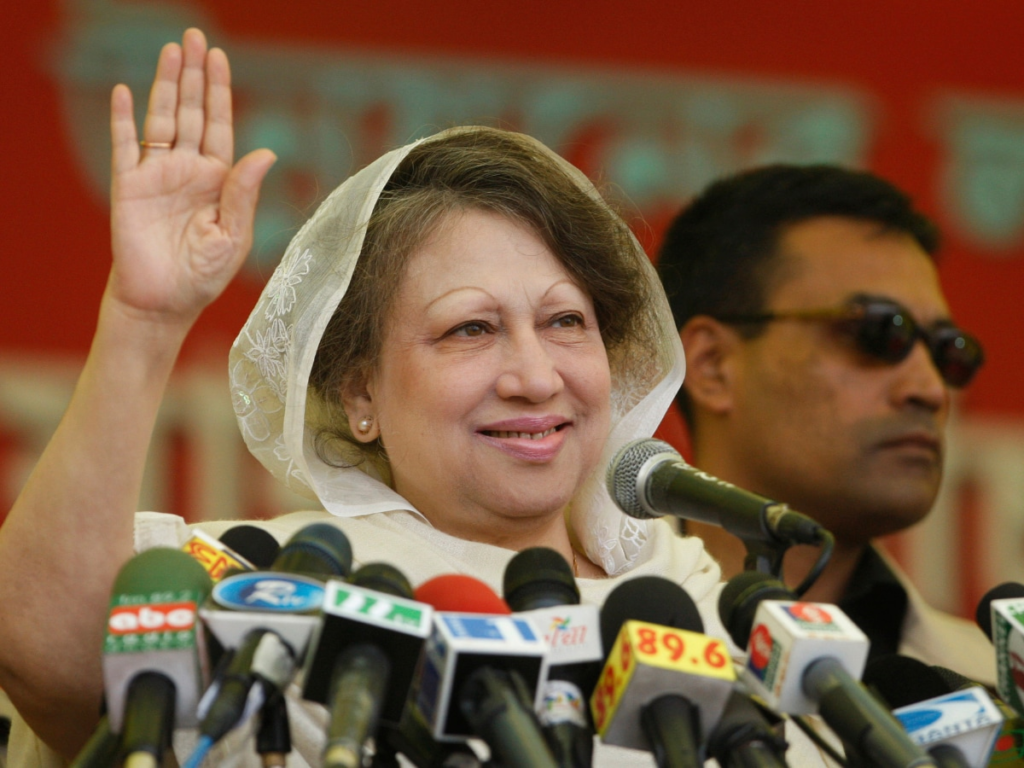Introduction: A New Chapter for Bangladesh
Khaleda Zia’s vision for Bangladesh has captured the nation’s attention as she delivers a stirring call for unity and recovery. On August 6, 2024, the former Prime Minister addressed the public with a message that resonated deeply amid ongoing political and social unrest. Her vision for Bangladesh emphasizes rebuilding the country through love and peace, rather than anger and revenge. As Bangladesh faces significant challenges, Zia’s speech outlines a hopeful path forward, advocating for collective effort and reconciliation to restore stability and foster national progress.

The Turning Point: The Current Political and Social Landscape
Bangladesh has been grappling with significant challenges over the past year. The country has experienced a series of intense political protests, economic struggles, and social conflicts. The roots of these issues are deeply embedded in long-standing political disputes and economic inequalities.
Timeline of Key Events Leading to Zia’s Address
- December 2023: Political unrest escalated in Bangladesh, with widespread demonstrations and violent clashes between opposing factions. The turmoil was driven by deep-seated grievances regarding electoral fairness and governance issues.
- January 2024: The government implemented emergency measures and initiated peace talks to address the escalating crisis. These discussions involved key political leaders, including the ruling party and opposition figures, as well as representatives from civil society organizations.
- March 2024: Despite efforts to stabilize the situation, sporadic violence and unrest continued. International observers and human rights organizations expressed concern over the deteriorating conditions and called for peaceful resolutions.
- May 2024: Khaleda Zia reemerged in the public eye, making calls for calm and urging all parties to engage in constructive dialogue. Her speeches during this period were marked by a tone of reconciliation and hope.
- August 6, 2024: In her most significant address since the crisis began, Khaleda Zia presented her vision for Bangladesh. Her speech highlighted the need for national unity, economic development, social cohesion, and effective governance as critical components for rebuilding the nation.
Zia’s Vision for Rebuilding Bangladesh
Khaleda Zia’s vision is rooted in the principles of love, peace, and cooperation. Her address outlined several key areas for action:
- National Unity and Reconciliation: Zia emphasized the importance of overcoming political and social divisions. She called on all Bangladeshis to set aside their differences and work together towards a common goal of national recovery and unity. “Our strength lies in our ability to come together,” she remarked during her speech.
- Economic Development: Recognizing the impact of economic instability on the populace, Zia advocated for robust economic policies aimed at stimulating growth, creating job opportunities, and addressing poverty. She proposed initiatives to enhance infrastructure, support small businesses, and attract foreign investment.
- Social Cohesion and Inclusivity: Zia underscored the need for promoting social harmony and inclusivity. She proposed measures to ensure equal access to resources and opportunities for all citizens, regardless of their socio-economic background. “We must build a society where every individual feels valued and included,” she stated.
- Good Governance and Transparency: Effective governance is crucial for implementing reforms and maintaining public trust. Zia called for greater transparency and accountability in government operations, urging leaders to act with integrity and prioritize the public good.
Expert Opinions on Zia’s Address
Dr. Amina Ahmed, a political analyst at the University of Dhaka, commented on Zia’s speech, saying, “Khaleda Zia’s focus on love and peace is a refreshing and much-needed approach. Her call for unity and constructive dialogue could pave the way for meaningful progress in Bangladesh.”
Professor Mohammad Tariq, an expert in South Asian studies at the London School of Economics, added, “Zia’s vision aligns with the principles of effective nation-building. By addressing both economic and social challenges, she is providing a comprehensive framework for Bangladesh’s recovery.”
The Path Forward: Implementing Zia’s Vision
The implementation of Khaleda Zia’s vision will require concerted efforts from all sectors of society. Key steps include:
- Engaging All Stakeholders: Political leaders, civil society organizations, and international partners must collaborate to implement the proposed reforms and ensure that the vision for Bangladesh is realized.
- Monitoring and Evaluation: Establishing mechanisms to monitor progress and evaluate the impact of the initiatives is essential for ensuring accountability and effectiveness.
- Public Awareness and Support: Raising awareness about the vision and garnering public support will be crucial for the success of the rebuilding efforts. Effective communication strategies and community engagement will play a significant role in this process.
Conclusion: A Hopeful Future for Bangladesh
Khaleda Zia’s address represents a pivotal moment in Bangladesh’s journey towards healing and unity. Her emphasis on love, peace, and collaborative effort offers a hopeful and pragmatic path forward. As the nation navigates its complex challenges, Zia’s vision provides a valuable framework for rebuilding and moving towards a more prosperous and inclusive future.
For Regular News and Updates Follow – Sentinel eGazette
Sources and Further Reading
FAQs
Q1: What are the main points of Khaleda Zia’s recent speech?
A1: Khaleda Zia’s speech emphasized national unity, economic development, social inclusivity, and good governance. She called for a collective effort to rebuild Bangladesh through love and peace.
Q2: How has the political situation in Bangladesh influenced Zia’s speech?
A2: The ongoing political unrest and economic struggles in Bangladesh have influenced Zia’s call for reconciliation and constructive dialogue as a means to address these challenges and unite the country.
Q3: What specific economic policies did Khaleda Zia propose in her speech?
A3: Zia proposed enhancing infrastructure, supporting small businesses, creating job opportunities, and attracting foreign investment as part of her economic development plan.
Q4: How did international experts react to Zia’s address?
A4: Experts like Dr. Amina Ahmed and Professor Mohammad Tariq have praised Zia’s speech for its focus on reconciliation and comprehensive approach to nation-building.
Q5: What steps are necessary to implement Zia’s vision for Bangladesh?
A5: Implementing Zia’s vision requires collaboration among political leaders, civil society, and international partners, along with establishing monitoring mechanisms and fostering public support.